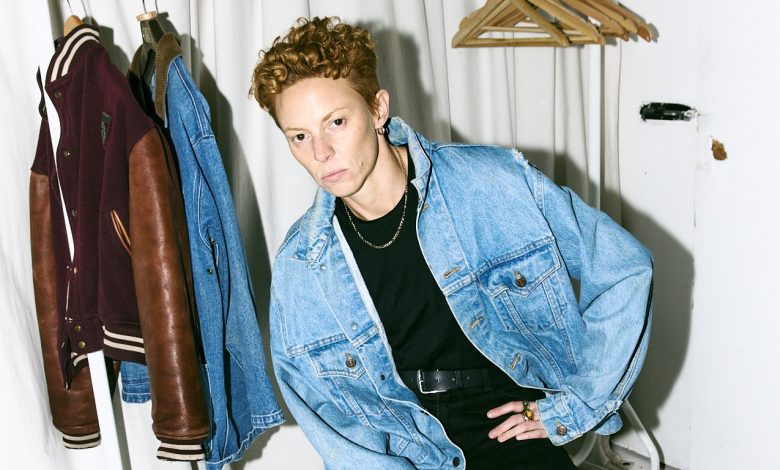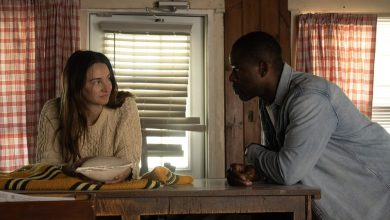La Roux Wants You to Know That Beyond Singing, She Also Writes, Produces and Performs Her Music

If you are attending the Friday opening night of the 59th edition of the Karlovy Vary International Film Festival, get ready for stars, fireworks and “Tropical Chancer,” “I’m Not Your Toy” and “Bulletproof” courtesy of La Roux.
The festival, kicking off the European summer holiday season, has a track record of free opening night concerts that get the Czech spa town grooving. Two years ago, Russell Crowe rocked the crowd, and electronic band Morcheeba got folks moving. Last year, Kosheen was in the house – well, actually in the square outside the Hotel Thermal.
This year, another big British name is ready to bring the party to Karlovy Vary, which runs through July 12: Grammy-winning synthpop act La Roux. And is tradition, the fireworks on stage will be followed by a fireworks display.
La Roux’s self-titled debut album in 2009 was a critical and commercial success and won numerous awards. It produced such hits as the ones mentioned above. It was the creation of singer Elly Jackson, known for reddish hair that also inspired the band name, and record producer Ben Langmaid, who later left the duo.
Jackson followed up the debut album with 2014’s Trouble in Paradise, followed by 2020’s Supervision.
Ahead of the Karlovy Vary performance, Jackson, born in London to actors Trudie Goodwin and Kit Jackson, talked to THR about how her music has changed, her next album, why she deserves more credit, and how female music creators must often still fight to get it.
How do you feel about how your music and your style have evolved and changed over time and how much you have developed as an artist?
I feel that probably the biggest difference is that, as time has gone on, I’ve learned how to be more authentically myself in my work, whilst creating stylized worlds. When I first started, thinking about it from a psychological perspective, maybe there was some kind of covering up of who I really am, but under the guise of creating characters. Although I’m really proud of that time and I wouldn’t change it for anything, and I love all the visuals I did, it’s nice to be able to take the shell off a little bit as you get older and learn to be who you are, but still in an artistic landscape. That’s been a nice process, a kind of unmasking, but hopefully not in a really boring way.
Where did the name La Roux come from?
Basically, I just didn’t want it to be my name, because I think that’s really boring. Generally, names as a kind of artist name are quite dull nowadays anyway. And I also wanted it to be a name that meant that I could do lots of different things throughout my career. I felt there was an ability within that to have a bigger musical scope. I wanted my name to be able to encapsulate different things and feelings, and that’s when I decided to come up with a project name.
The guy that I did the artwork with on the first album is Alex Brown. We’re friends and we met when he was still at uni. I told him, “I’ve given myself this week to come up with a name for the project, and if it goes on any longer than that, it’s going to get silly.” When I went round to his house, he said, “I just found this ’80s baby name book in a skip outside – maybe you’ll find a name in here.”
The first page I opened said Laroux,” and I’d wanted the name to encapsulate my red hair. I also wanted to have the letter X in it, because my music was electronic, and when I was a teenager, those things went together. And I also wanted it to be a bit French, because I have some French heritage in my background. And weirdly, that is exactly what those words mean. La Roux means red-haired one in French. But even more handily, it’s the male version of that. So it’s actually, kind of by accident, a very androgynous name as well.
A friend once said: “La Roux reminds me a bit of an actress…”
Tilda Swinton?
Exactly! Have you met her? Or was she an inspiration for you?
Weirdly, I didn’t actually know who she was when I was younger. My mom is an actress in the U.K., and she knew who she was, of course. And obviously, I know who Tilda Swinton is now, but I didn’t then. I was very young. My mum was like: “There’s some similarity between you and Tilda Swinton. And I said: I don’t even know who she is, so it can’t be intentional.”
Anything that I had been like had probably come more from listening to Annie Lennox my whole life. I just happened to be ginger, and I had short hair, and I like ’80s music, so the things are going to get combined.
So no, it wasn’t intentional at all. But then I met her, and we had a couple of pictures together, and she’s very sweet. So, it was a brilliant moment.
With your family background and your talents, have you done any acting or have you created any film or TV music?
One of the biggest frustrations of my career is that people never asked me to produce anything when I produced my last three albums, and I play all the parts, and I arrange and compose every record. It’s always been really shocking to me that no one has asked me to do a soundtrack. No one’s ever asked me to write anything on commission or produce anything. I find it very strange that it makes me feel like we must still live in a sexist world that I hope we don’t live in, but we do. I would love to do that, but I’ve never been asked.
I did get asked to audition for a film role once or twice, but weirdly, being on stage in front of 50,000 people wouldn’t scare me, but doing that scares the living daylights out of me. I really like doing little bits of silly sort of acting in music videos. I really enjoy that. And I don’t think I’d be a terrible actress, but the setting would have to be very right. And I’m not the kind of be-it-all, do-it-all kind of artist. I like music.
Friends of mine in Central and Eastern Europe all know your music. It seems like you have a fan base there…but have you played a film festival before?
I can’t remember exactly where “Bulletproof” was a number one, but I remember it being big in that part of the world. I’ve played all over Germany. I’ve played in Poland. And I have played a fashion show or two. But I don’t think I’ve done a festival before.
How important was or is “Bulletproof” to you personally and your career?
Actually, “Bulletproof” came at the end of the first record. It was the last thing we wrote for the record. And it wasn’t intentional. What happened was: Ben was on the phone, and I was in the living room on the keyboard, and I started playing the main sounds, an arpeggiated part. And he just came in and said, “Record that!” And then we just wrote the song. I was pissed off at the time because I’d been trying to date somebody, and they’d been dicking me around. I’d been listening to a lot of Yazoo, and that was a big reference on the day.
Why “Bulletproof” is weird for me is that it was throwaway when I wrote it, and it still feels really throwaway to me. It’s like it’s not for me, even though I wrote every single part in it and co-wrote the lyrics with Ben. It doesn’t represent who I am as an artist or a person at all. For me, I would say it’s outside of the catalog, which is probably also why it’s successful. But I feel that track just has a completely different feeling from anything else, which is also why it’s big.
We’d already written the album. We were already getting signed to Polydor. We were in a very relaxed, confident space, and I think for both of us, that day was just easy, because it just flowed. And we knew we’d written a really good song, but neither of us knew we’d written something that was going to essentially pay us for the rest of our lives. It is crazy when you think about what an afternoon can do.
Which one of your tracks is, or are, a good representation of who you are as an artist and person?
I would say “Tropical Chancer,” “Sexotheque,” “Cruel Sexuality” [on album 2, Trouble in Paradise]. “Colourless Colour” [from the first album] was very me at that time, probably the most me track on that album at the time. And “Quicksand” was a big one for me back then, too. And then later, “Otherside” is my favorite track from Supervision and is the most me. “Automatic Driver” and “Gullible Fool” as well.
Since these days, it seems like everything is political, any political or social issues you’d like to share?
Just: Free Palestine.
What’s next for La Roux?
I have a new record that is written and finished, and it’s on its way. I’m also working on other music. I’ve gotten back into my flow now.
Anything you can share about this fourth studio album you just mentioned? Is it different in any way?
It’s a La Roux record. It’s not like I’ve gone down some wild [path] or anything, but at the same time, I would say that it’s a lot warmer. It’s got R&B references, but I wouldn’t say that it’s an R&B record. It has R&B moments, but it’s a pop record. It’s got my own slant on an R&B flavor, shall we say?
Before I let you get back to work, anything else you’d like to highlight or follow up on?
The only thing at the moment is that I’ve really realized how frustrating I find it that I don’t get recognized in the same way as my male counterparts for my production work. That’s something I want to talk about. I kind of just ignored it in the past and was just like, “Whatever, it is what it is.” But it’s something that I recently found I actually really need to speak up about, because otherwise it’s just going to continue. I am doing three years of work at a computer by myself, and then people ask: “Which guy did this?” It’s beyond frustrating, as I’m sure you can imagine.
So, I’m now always trying to remind people that, when you listen to my music, I wrote and performed all of it, unless it’s a saxophone or the odd bass part that’s difficult. Maybe three parts across an entire album are performed by somebody else. Sometimes, I get a percussionist in at the end who specializes in percussion. Or if I want the piano to be really grandiose and old-school, then I would get a pianist in. But I would have written the basic part already. That happens maybe three times across an entire album, and still, I don’t get the credit for the other 90 percent or 80 percent that I did. It’s just very frustrating.
It’s not just men who do it. Women do it as well. We’re just brought up in a way where we categorize certain tasks into genders, and we don’t know exactly where it starts or how we do it. It happens to all of us, and you can’t really blame people for just what they’ve absorbed throughout their lives. But we can try and change it moving forward. It’s just about women communicating, unfortunately, slightly louder than men have to, which is also annoying. Maybe we just have to find ways of talking about it and making sure people do know, because otherwise, why would I bother sitting there all day trying to get better at something if no one even knows I’m getting better at it or recognizes that I even did it in the first place.
Source: Hollywoodreporter
HiCelebNews online magazine publishes interesting content every day in the music section of the entertainment category. Follow us to read the latest news.
Related Posts
- Netflix Is Shark-Attacking Discovery and Nat Geo This Summer
- National Geographic’s ‘Sharkfest’ Returns: When and Where to Watch It Online for Free Without Cable
- How ’KPop Demon Hunters’ Created the Year’s Catchiest Soundtrack
- Can Diddy’s Career Survive His Verdict? What the Music Industry Is Saying
- 'Squid Game' Star Lee Byung-hun on Possible Front Man Spinoff





